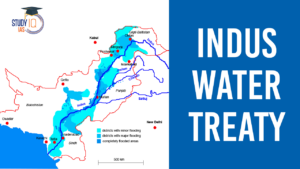Table of Contents
Climate-Related Trade Restrictions
Carbon Border Adjustment Mechanism (CBAM)
- The EU implemented the Carbon Border Adjustment Mechanism (CBAM) in 2023, which imposes taxes on certain imported products based on their carbon emissions during production.
- g., steel produced with higher emissions than EU standards incurs additional taxes upon importation.
- CBAM aims to keep European industries competitive while maintaining high environmental standards and preventing “carbon leakage,” where production shifts to countries with less stringent emission regulations.
Impact on Developing Countries
- Countries like China and India argue that CBAM acts as an unfair trade barrier, violating international agreements such as the Paris Agreement, which seeks to protect developing nations from adverse economic impacts of climate measures.
- The mechanism overlooks the differentiation principle in global climate negotiations that allows developing nations to be treated differently from developed ones.
- Industries in developed economies may benefit from CBAM since their products would not face similar taxes, thus gaining a competitive edge in the EU market.
Opposition and Future Discussions
- The BASIC group, which includes Brazil, South Africa, India, and China, formally requested discussions on these trade measures at COP29.
- However, this proposal faced strong opposition from the EU and other nations and has been postponed for now.
- CBAM is not unique; it is part of a broader trend where climate-related trade measures are being considered by other countries, including the UK and Canada.
Broader Trends in Protectionism
- Increasing Protectionism Linked to Climate Change: Climate change is accelerating protectionist policies driven by various factors, including economic security concerns.
- g., former U.S. President Donald Trump promised tariffs on imports from China, reflecting fears over energy security rather than climate concerns.
- The dominance of China in renewable energy resources has raised alarms in other nations about dependency on a single country for critical technologies.
- Supply Chain Vulnerabilities: The COVID-19 pandemic highlighted vulnerabilities within global supply chains concentrated in specific regions.
- This has led to a trend of “nearshoring” (moving production closer to home) or “reshoring” (bringing production back home) as countries seek greater control over key resources.
- A study by the Asian Development Bank indicated that measures like CBAM may have minimal impact on reducing greenhouse gas emissions compared to other available options.
Natural Disasters and Supply Chains
- Climate change is increasing the frequency and severity of natural disasters, disrupting global supply chains and causing significant economic losses.
- These disruptions are prompting countries to reassess their reliance on extensive global networks.
Conclusion
The discussions surrounding climate-related trade measures highlight a complex interplay between environmental objectives and international trade dynamics. While initiatives like CBAM aim to promote sustainability, they risk exacerbating protectionism and disadvantage developing nations. As countries navigate these challenges, it is crucial to foster dialogue that balances climate goals with equitable trade practices.


 UDAN Scheme, Objectives, Funding and Ach...
UDAN Scheme, Objectives, Funding and Ach...
 Indus Water Treaty 1960 Suspended by Ind...
Indus Water Treaty 1960 Suspended by Ind...
 5 Years of SVAMITVA Scheme and Its Benef...
5 Years of SVAMITVA Scheme and Its Benef...





















